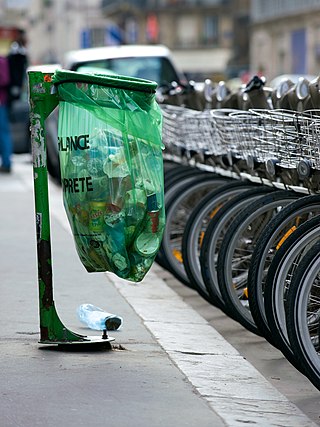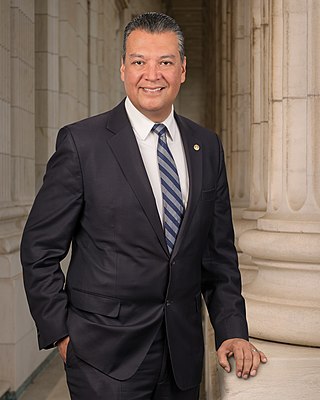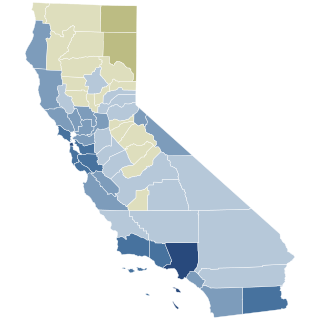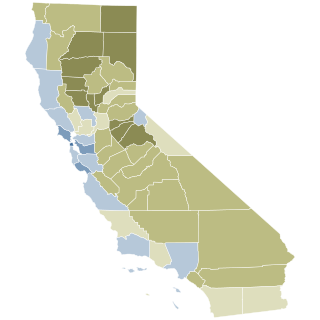
Proposition 60 was an amendment of the Constitution of California, enacted in 2004, guaranteeing the right of a party participating in a primary election to also participate in the general election that follows. It was proposed by the California Legislature and approved by the voters in referendum held as part of the November 2004 election, by a majority of 67%.

A plastic bag, poly bag, or pouch is a type of container made of thin, flexible, plastic film, nonwoven fabric, or plastic textile. Plastic bags are used for containing and transporting goods such as foods, produce, powders, ice, magazines, chemicals, and waste. It is a common form of packaging.

Alejandro "Alex" Padilla is an American politician serving as the senior United States senator from California, a seat he has held since 2021. A member of the Democratic Party, Padilla served as the 30th secretary of state of California from 2015 to 2021 and was a member of the California State Senate and the Los Angeles City Council.

Californians Against Waste is an environmental advocacy organization that advocates for stronger environmental laws and more recycling at the state and local level. The organization was founded in 1977 and has sponsored numerous successful citizen initiatives. It is headquartered two blocks from California's state capitol in Sacramento.

California's state elections were held November 2, 2004. Necessary primary elections were held on March 2. Up for election were all the seats of the State Assembly, 20 seats of the State Senate, and sixteen ballot measures.

A reusable shopping bag, sometimes called a bag for life in the UK, is a type of shopping bag which can be reused many times, in contrast to single-use paper or plastic shopping bags. It is often a tote bag made from fabric such as canvas, natural fibres such as jute, woven synthetic fibers, or a thick plastic that is more durable than disposable plastic bags, allowing multiple use. Other shoppers may use a string bag or a wheeled trolley bag. They are often sold in supermarkets and apparel shops.
A plastic bag ban or charge is a law that restricts the use of lightweight plastic bags at retail establishments. In the early 21st century, there has been a global trend towards the phase-out of lightweight plastic bags. Single-use plastic shopping bags, commonly made from low-density polyethylene (LDPE) plastic, have traditionally been given for free to customers by stores when purchasing goods: the bags have long been considered a convenient, cheap, and hygienic way of transporting items. Problems associated with plastic bags include use of non-renewable resources, difficulties during disposal, and environmental impacts. Concurrently with the reduction in lightweight plastic bags, shops have introduced reusable shopping bags.
Steven Maviglio is a political consultant. He is also the founder and President of Forza Communications, a public affairs and campaign firm based in Sacramento, California.

California state elections in 2016 were held on Tuesday, November 8, 2016, with the primary elections being held on June 7, 2016. In addition to the U.S. presidential race, California voters elected one member to the United States Senate, all of California's seats to the House of Representatives, all of the seats of the State Assembly, and all odd-numbered seats of the State Senate.

California Proposition 59 is a non-binding advisory question that appeared on the 2016 California November general election ballot. It asked voters if they wanted California to work towards overturning the Citizens United U.S. Supreme Court ruling.

Proposition 51 is a California ballot proposition that passed on the November 8, 2016 ballot, regarding $9 billion in bonds to fund construction and improvement of K-12 and community college facilities. The measure designates $7 billion for K-12 projects falling under four types of projects, and $2 billion for any facility project for community colleges. No other bond measures related to education have been on the California ballot since 2006.

Proposition 55 is a California ballot proposition that passed on the November 8, 2016 ballot, regarding extending by twelve years the temporary personal income tax increases enacted in 2012 on earnings over $250,000, with revenues allocated to K–12 schools, California Community Colleges, and, in certain years, healthcare. Proposition 55 will raise tax revenue by between $4 billion and $9 billion a year. Half of funds will go to schools and community colleges, up to $2 billion a year would go to Medi-Cal, and up to $1.5 billion will be saved and applied to debt.

Proposition 56 is a California ballot proposition that passed on the November 8, 2016 ballot. It increased the cigarette tax by $2.00 per pack, effective April 1, 2017, with equivalent increases on other tobacco products and electronic cigarettes containing nicotine. The bulk of new revenue is earmarked for Medi-Cal.

Proposition 62 was a California ballot proposition on the November 8, 2016, ballot that would have repealed the death penalty and replaced it with life imprisonment and forced labor without possibility of parole. It would have applied retroactively to existing death sentences and increased the portion of life inmates' wages that may be applied to victim restitution.

Proposition 66 was a California ballot proposition on the November 8, 2016, ballot to change procedures governing California state court challenges to capital punishment in California, designate superior court for initial petitions, limit successive petitions, require appointed attorneys who take noncapital appeals to accept death penalty appeals, and exempt prison officials from existing regulation process for developing execution methods.

Proposition 67 was a California ballot proposition on the November 8, 2016 ballot. A "Yes" vote was to approve, and a "No" vote to reject, a statute that prohibits grocery and other stores from providing customers single–use plastic or paper carryout bags but permits the sale of recycled paper bags and reusable bags for a fee.

There is no national plastic bag fee or ban currently in effect in the United States. However, the states of California, Colorado, Connecticut, Delaware, Hawaii, Maine, New Jersey, New York, Oregon, Rhode Island, Vermont and Washington and the territories of American Samoa, Guam, Northern Mariana Islands, United States Virgin Islands and Puerto Rico have banned disposable bags. Over 200 counties and municipalities have enacted ordinances either imposing a fee on plastic bags or banning them outright, including all counties in Hawaii.

The 2022 California elections took place on November 8, 2022. The statewide direct primary election was held on June 7, 2022.

Proposition 31 was a California ballot proposition regarding the regulation and prohibition of flavored tobacco that appeared on the 2022 general election ballot.














